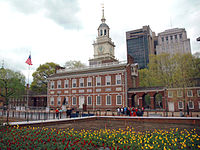| This article is part of a series on the |
| United States Continental Congress |
|---|
 |
| Predecessors |
| First Continental Congress |
| Second Continental Congress |
| Congress of the Confederation |
| Members |
| Related |
|
|
The Continental Congress was initially a convention of delegates from several British American colonies at the height of the American Revolution era, who spoke and acted collectively for the people of the Thirteen Colonies that ultimately became the United States. The term mostly refers to the First Continental Congress of 1774 and the Second Continental Congress of 1775–1781. It also refers to the Congress of the Confederation of 1781–1789, which covers the period following the establishment of American independence with the end of the Revolutionary War. During this period, the Continental Congress served as the chief legislative and executive body of the U.S. government.
The unicameral Congress of the Confederation, officially styled "The United States in Congress Assembled," delegates elected by the legislature of the various states. The Confederation Congress was the immediate successor to the Second Continental Congress; and delegates to it were similarly chosen. Many of the delegates to the initial 1775 session of the Second Continental Congress had also attended the previous First Continental Congress. Altogether, The Biographical Directory of the United States Congress lists 343 men who served as delegates to the Continental Congress in three incarnations from 1774 to 1789; also listed are another 90 persons who were elected as delegates but never served.